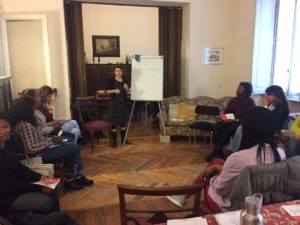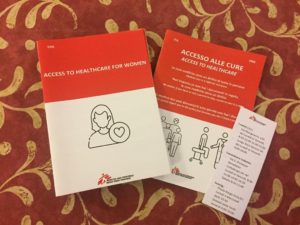As anyone who has lived in Italy will know, accessing services can be extremely complicated and tiring, and navigating the bureaucracy involved can be challenging. For migrant women this challenge is amplified by a linguistic and cultural barrier and, unfortunately, an even greater barrier of fear among those whose migration status is uncertain. Perhaps most important among these services is the healthcare system. Access to healthcare is a basic right and public healthcare is guaranteed for every person in Italy, but fear and misinformation frequently prevent women, and as a consequence their families, from exercising this right.
 This is why, this October, we began a pilot project in collaboration with YWCA-UCDG Torino and Medici Senza Frontiere (MSF) Italy to inform and guide migrant women in access to healthcare. During three sessions, lead by Valentina Reale from MSF Torino, with a group of women from Nigeria and the Democratic Republic of Congo we explored the different ways migrants, regardless of their status, can access healthcare, in particular reproductive and maternal healthcare services.
This is why, this October, we began a pilot project in collaboration with YWCA-UCDG Torino and Medici Senza Frontiere (MSF) Italy to inform and guide migrant women in access to healthcare. During three sessions, lead by Valentina Reale from MSF Torino, with a group of women from Nigeria and the Democratic Republic of Congo we explored the different ways migrants, regardless of their status, can access healthcare, in particular reproductive and maternal healthcare services.
We put together this initial group of women with similar linguistic and cultural backgrounds to facilitate clear and open communication, especially given the intimate nature of some of the topics, and we also involved our linguistic and cultural mediator in all of the sessions. Among the participants were women who have lived in Italy for years and had children here, as well as more recent arrivals who are seeking asylum, and this diversity was reflected in their experience and understanding of the Italian system.
From the initial registration with your local healthcare body, to registering for a family doctor or registering your child with a paediatrician, to attending cancer-prevention check-ups or requesting contraception, we explained the ins and outs of the process and encountered a variety of questions and misconceptions along the way. For example, not everybody knew that all children have the right to have their own paediatrician, regardless of their parents’ immigration status. Not everybody knew that there is a hospital in Turin that offers a legal option of circumcision for young boys. Not everyone knew about the different ways you can qualify for exemptions from having to pay for tickets or appointments, and how to receive such exemptions.
Based on the success of this initial course and the interest and enthusiasm with which the women participated, we hope to continue to offer such training for other groups of migrant women, not only so that they become more informed for their own benefit and that of their families, but also so that they can spread this knowledge to other members of their communities. For us as an association, it can be extremely difficult to engage with migrant women who find themselves in a precarious situation with their immigration status because they are so scared of interacting with authorities, but these are exactly the women who we are hoping to reach by utilising the powerful tool that word of mouth can become within these tight-knit communities.  Thanks to MSF we have English and Italian language material that summarises the contents of the course, which will be invaluable for our work in future and to support participants’ ongoing access to services.
Thanks to MSF we have English and Italian language material that summarises the contents of the course, which will be invaluable for our work in future and to support participants’ ongoing access to services.
All migrant women should know that they have the right to healthcare for themselves and their children, and that their doctor will never report their immigration status.
